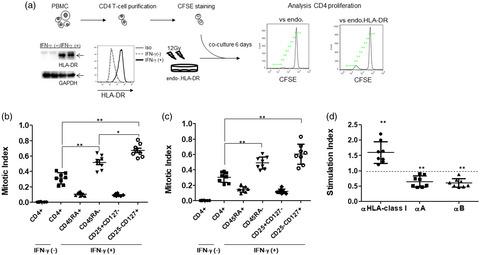当前位置:
X-MOL 学术
›
Clin. Exp. Immunol.
›
论文详情
Our official English website, www.x-mol.net, welcomes your feedback! (Note: you will need to create a separate account there.)
The suppressive effect on CD4 T cell alloresponse against endothelial HLA-DR via PD-L1 induced by anti-A/B ligation.
Clinical & Experimental Immunology ( IF 4.6 ) Pub Date : 2020-06-23 , DOI: 10.1111/cei.13482 K Iwasaki 1 , H Hamana 2 , H Kishi 2 , T Yamamoto 3 , T Hiramitsu 3 , M Okad 3 , T Tomosugi 3 , A Takeda 3 , S Narumi 3 , Y Watarai 3 , Y Miwa 1 , M Okumura 4 , Y Matsuoka 4 , K Horimi 4 , A Muraguchi 2 , T Kobayash 4
Clinical & Experimental Immunology ( IF 4.6 ) Pub Date : 2020-06-23 , DOI: 10.1111/cei.13482 K Iwasaki 1 , H Hamana 2 , H Kishi 2 , T Yamamoto 3 , T Hiramitsu 3 , M Okad 3 , T Tomosugi 3 , A Takeda 3 , S Narumi 3 , Y Watarai 3 , Y Miwa 1 , M Okumura 4 , Y Matsuoka 4 , K Horimi 4 , A Muraguchi 2 , T Kobayash 4
Affiliation

|
While donor‐specific human leukocyte antigen (HLA) antibodies are a frequent cause for chronic antibody‐mediated rejection in organ transplantation, this is not the case for antibodies targeting blood group antigens, as ABO‐incompatible (ABO‐I) organ transplantation has been associated with a favorable graft outcome. Here, we explored the role of CD4 T cell‐mediated alloresponses against endothelial HLA‐D‐related (DR) in the presence of anti‐HLA class I or anti‐A/B antibodies. CD4 T cells, notably CD45RA‐memory CD4 T cells, undergo extensive proliferation in response to endothelial HLA‐DR. The CD4 T cell proliferative response was enhanced in the presence of anti‐HLA class I, but attenuated in the presence of anti‐A/B antibodies. Microarray analysis and molecular profiling demonstrated that the expression of CD274 programmed cell death ligand 1 (PD‐L1) increased in response to anti‐A/B ligation‐mediated extracellular signal‐regulated kinase (ERK) inactivation in endothelial cells that were detected even in the presence of interferon‐γ stimulation. Anti‐PD‐1 antibody enhanced CD4 T cell proliferation, and blocked the suppressive effect of the anti‐A/B antibodies. Educated CD25+CD127− regulatory T cells (edu.Tregs) were more effective at preventing CD4 T cell alloresponses to endothelial cells compared with naive Treg; anti‐A/B antibodies were not involved in the Treg‐mediated events. Finally, amplified expression of transcript encoding PD‐L1 was observed in biopsy samples from ABO‐I renal transplants when compared with those from ABO‐identical/compatible transplants. Taken together, our findings identified a possible factor that might prevent graft rejection and thus contribute to a favorable outcome in ABO‐I renal transplantation.
中文翻译:

抗 A/B 结扎诱导的 PD-L1 对 CD4 T 细胞同种异体反应对内皮 HLA-DR 的抑制作用。
虽然供体特异性人类白细胞抗原 (HLA) 抗体是器官移植中慢性抗体介导的排斥反应的常见原因,但针对血型抗原的抗体并非如此,因为 ABO 不相容 (ABO-I) 器官移植已被证实与良好的移植结果相关。在这里,我们探讨了在存在抗 HLA I 类或抗 A/B 抗体的情况下 CD4 T 细胞介导的针对内皮 HLA-D 相关 (DR) 的同种异体反应的作用。CD4 T 细胞,尤其是 CD45RA 记忆型 CD4 T 细胞,响应内皮 HLA-DR 发生广泛增殖。CD4 T 细胞增殖反应在抗 HLA I 类存在时增强,但在抗 A/B 抗体存在时减弱。-内皮细胞介导的细胞外信号调节激酶 (ERK) 失活,即使在干扰素-γ 刺激存在的情况下也能检测到。抗 PD-1 抗体增强了 CD4 T 细胞增殖,并阻断了抗 A/B 抗体的抑制作用。与幼稚 T reg相比,受过教育的 CD25 + CD127 -调节性 T 细胞 (edu.T regs ) 在预防 CD4 T 细胞对内皮细胞的同种异体反应方面更有效;抗 A/B 抗体不参与 T reg- 介导的事件。最后,与来自 ABO 相同/相容移植的活检样本相比,在来自 ABO-I 肾移植的活检样本中观察到编码 PD-L1 的转录本的扩增表达。总之,我们的研究结果确定了一个可能的因素,可以防止移植排斥,从而有助于 ABO-I 肾移植的良好结果。
更新日期:2020-06-23
中文翻译:

抗 A/B 结扎诱导的 PD-L1 对 CD4 T 细胞同种异体反应对内皮 HLA-DR 的抑制作用。
虽然供体特异性人类白细胞抗原 (HLA) 抗体是器官移植中慢性抗体介导的排斥反应的常见原因,但针对血型抗原的抗体并非如此,因为 ABO 不相容 (ABO-I) 器官移植已被证实与良好的移植结果相关。在这里,我们探讨了在存在抗 HLA I 类或抗 A/B 抗体的情况下 CD4 T 细胞介导的针对内皮 HLA-D 相关 (DR) 的同种异体反应的作用。CD4 T 细胞,尤其是 CD45RA 记忆型 CD4 T 细胞,响应内皮 HLA-DR 发生广泛增殖。CD4 T 细胞增殖反应在抗 HLA I 类存在时增强,但在抗 A/B 抗体存在时减弱。-内皮细胞介导的细胞外信号调节激酶 (ERK) 失活,即使在干扰素-γ 刺激存在的情况下也能检测到。抗 PD-1 抗体增强了 CD4 T 细胞增殖,并阻断了抗 A/B 抗体的抑制作用。与幼稚 T reg相比,受过教育的 CD25 + CD127 -调节性 T 细胞 (edu.T regs ) 在预防 CD4 T 细胞对内皮细胞的同种异体反应方面更有效;抗 A/B 抗体不参与 T reg- 介导的事件。最后,与来自 ABO 相同/相容移植的活检样本相比,在来自 ABO-I 肾移植的活检样本中观察到编码 PD-L1 的转录本的扩增表达。总之,我们的研究结果确定了一个可能的因素,可以防止移植排斥,从而有助于 ABO-I 肾移植的良好结果。


























 京公网安备 11010802027423号
京公网安备 11010802027423号